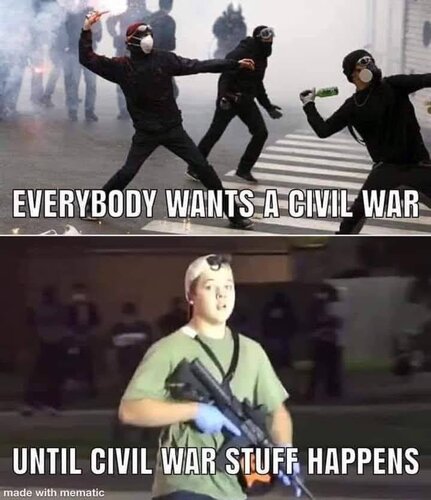Riiiiiiiight... he shows u on a place he has no business to be, murders people and that does not show intent?
No it does not.
Not in the eyes of the law. I'm sorry if that hurts your feelz
Please go read something about the law. Anything!
Here stupid, read the following and then go somewhere and gas yourself to death
Wisconsin’s criminal statute states that a person has a right to act in self-defense, without being convicted of a crime, by either threatening to use force against another person or intentionally using force against another person “for the purpose of preventing or terminating what the person reasonably believes to be an unlawful interference with his or her person by such other person,” provided that (1) the person acting in self-defense only threatens or uses force “as the actor reasonably believes is necessary to prevent or terminate the interference” and (2) if the person acting in self-defense intentionally uses or threatens to use an amount of force that is “likely to cause death or great bodily harm,” he or she must “reasonably [believe] that such force is necessary to prevent imminent death or great bodily harm to himself or herself.” Wis.Stat. § 939.48(1).
By contrast, Wisconsin’s statute concerning Second Degree Intentional Homicide specifically states that if a person acts in self-defense based on an actual but mistaken belief about the risk of harm to themselves or the amount of force they need to threaten or use to prevent the other person from harming them while killing the other person in an act of self-defense, then they can be convicted of Second Degree Intentional Homicide rather than First Degree Intentional Homicide. Wisconsin’s statute on Second Degree Intentional Homicide explains that if the prosecution is unable to prove beyond a reasonable doubt that the defendant intended to kill, and did kill, another person yet the person claiming self-defense “believed he or she or another was in imminent danger of death or great bodily harm and that the force used was necessary to defend the endangered person” yet one of the defendant’s beliefs were unreasonable, then the defendant can be charged with Second Degree Intentional Homicide. Wis.Stat. § 940.05(1); Wis.Stat. §940.01(2)(b).
A common issue that is raised in self-defense cases by the prosecution is whether the defendant could have avoided intentionally using force or threatening to intentionally use force by either retreating from the situation. In Wisconsin, unlike some states, there is no duty for someone to retreat during a conflict but a jury can consider whether a defendant’s failure to retreat, if possible, demonstrates that the defendant’s belief that he or she was at risk of imminent harm from the other person or that he or she needed to use force to stop the other person from harming him or her was a reasonable belief. For example, if you were at your friend’s house, got in a heated argument, and your friend charged at you from the other side of the room while you were standing next to the front door, you may be able to safely leave house and run to your vehicle, rather than engage your friend in a fight.
Additionally, the prosecution commonly argues that the person claiming self-defense is not entitled to self-defense because his or her behavior was the type of behavior that causes another person to attack and that the attack would not have happened if the other person had not been provoked. Wis.Stat. § 939.48(2)(a). Under this situation, a person forfeits the right to use self-defense unless:
(1) the attack results in the behavior that is the person claiming self-defense reasonably believes is likely to result in death or great bodily harm and the person claiming self-defense does not use “force intended or likely to cause death or bodily harm” to the other person; Wis.Stat. § 939.48(2)(a);
(2) the person claiming self-defense has “exhausted every other reasonable means to escape from or otherwise avoid death or great bodily harm at the hands of his or her assailant;” Wis.Stat. § 939.48(2)(a); or
(3) the person claiming self-defense “in good faith withdraws from the fight and gives adequate notice thereof to his or her assailant.” Wis.Stat. § 939.48(2)(b).
Yet if a person intentionally provokes a fight as part of a plan to cause death or great bodily harm another person and claim a right of self-defense, he or she forfeits the right to use self-defense because his or her action is premeditated or intentional. Wis.Stat. § 939.48(2)(b).
Nonetheless, even if a defendant were to have mistaken beliefs that another person was about to harm him or her or that it was necessary to threaten or intentionally use force to terminate the unlawful interference, the defendant may show that he or she acted reasonably even though one or both of his beliefs were mistaken.
Refer to Wis JI- Criminal 770; Maichle
v. Jonovic, 69 Wis. 2d 622, 628, 230 N.W.2d 789, 793 (1975) (applying mistake to a defendant’s self-defense claim in a civil context);
Crotteau v. Karlgaard, 48 Wis.2d 245, 250, 179 N.W.2d 797, 799 (1970);
Keep v. Quallman (1887), 68 Wis. 451, 32 N.W. 233. Understandably, in situations where someone believes another person may attack him or her, there often is not much time to evaluate the situation such that it may be easy to mistake the other person’s actions for a threat even if it later turns out that the belief was mistaken. A good example of this is the Philandro Castile case in Minnesota where a police officer shot the driver of a vehicle he had pulled over when the driver told the officer he had a firearm and then reached in his back pocket, possibly in response to the officer’s command that he present his driver’s license and proof of registration. Under these circumstances, the officer’s belief that Mr. Castile presented an imminent threat of death or great bodily harm may have been considered mistaken but reasonable.





